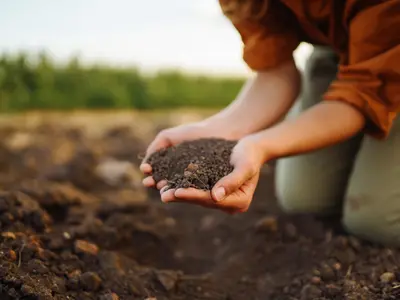
Compost is a valuable, natural soil improver that you can easily make yourself. But what exactly is compost, how does it work, and why is it so beneficial for your garden? In this blog, we delve into the world of composting and show you how to get started with this black gold for your plants!
What Is Compost?
Compost is the result of a natural decomposition process in which organic material, such as vegetable and garden waste, is transformed into nutrient-rich humus. This process is driven by bacteria, fungi, and small soil organisms that work together to break down the waste. The end product is a crumbly, dark, and fertile soil improver that enhances soil structure and provides essential nutrients for plants.
Why Is Compost So Valuable?
Compost offers countless benefits for both your garden and the environment. Firstly, it enriches the soil with essential nutrients, helping plants grow healthier and stronger. Additionally, compost improves soil structure, making it better at retaining moisture while remaining well-aerated. This is particularly useful for clay soil, which becomes less compact, and sandy soil, which retains moisture more effectively. Moreover, compost helps reduce garden waste and contributes to a more sustainable environment by diverting waste from landfill.
How to Make Your Own Compost
Making your own compost is simple and can be done in different ways, depending on the space you have available. Here are some basic steps:
- Choose a compost bin or pile – You can use a dedicated compost bin or simply create a compost heap in a corner of your garden.
- Collect suitable materials – Use vegetable and fruit scraps, leaves, prunings, coffee grounds, eggshells, and grass clippings. Avoid meat, dairy, and fats, as they can attract pests.
- Ensure the right balance – A good compost pile contains both ‘green’ materials (such as fruit and vegetable scraps, which provide nitrogen) and ‘brown’ materials (such as twigs and leaves, which provide carbon). A roughly 50/50 ratio works best.
- Aerate the compost regularly – Turning the compost heap occasionally ensures sufficient oxygen, which speeds up decomposition and prevents unpleasant odours.
- Be patient – Depending on conditions, it can take between 3 to 12 months for compost to fully decompose and be ready for use.
How to Use Compost in Your Garden
Once your compost is ready, you can use it in various ways in your garden:
- As a soil improver – Mix a layer of compost into your garden or vegetable patch to improve structure and nutrient content.
- As mulch – Spread a layer of compost around plants to retain moisture and suppress weed growth.
- In pots and containers – Add compost to potting soil for extra nutrients and improved aeration.
- For lawn care – Sprinkling thin layers of compost over your lawn helps maintain healthy grass and encourages root growth.
Common Composting Mistakes
Although composting is easy, there are a few pitfalls to avoid:
- Too much of one type of material – A compost heap made up entirely of grass clippings or leaves will not break down properly. Ensure a good balance of green and brown materials.
- Too wet or too dry – A compost heap should be as moist as a wrung-out sponge. If it is too wet, add dry materials like twigs. If it is too dry, add some water.
- Lack of aeration – Without oxygen, compost can rot instead of decomposing properly. Be sure to turn your heap regularly.
Start Composting Today!
Composting is a simple and sustainable way to enrich your garden and reduce waste. Whether you have a large garden or a small balcony, there are always ways to reuse organic material and contribute to a greener world. So what are you waiting for? Start composting today and experience the benefits of this black gold for yourself!
